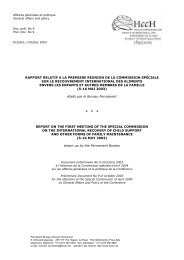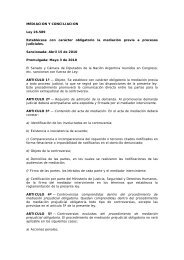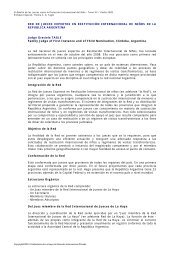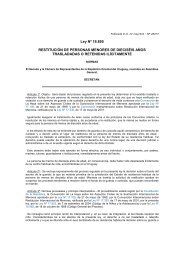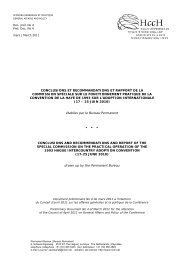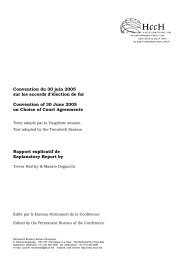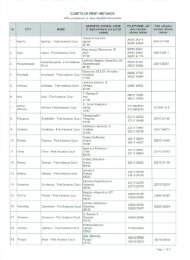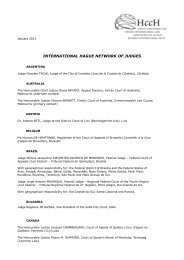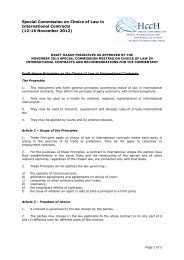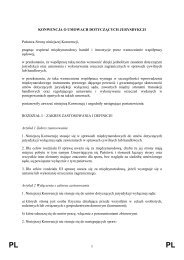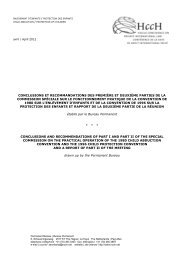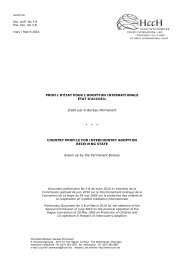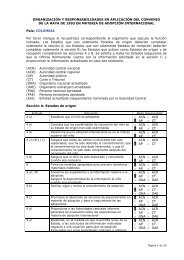aperçu des réponses au questionnaire accompagnant la ... - HCCH
aperçu des réponses au questionnaire accompagnant la ... - HCCH
aperçu des réponses au questionnaire accompagnant la ... - HCCH
You also want an ePaper? Increase the reach of your titles
YUMPU automatically turns print PDFs into web optimized ePapers that Google loves.
Question Réponse / Reply État / State<br />
14. Exequatur<br />
14.1. Deny<br />
enforcement of foreign<br />
judgm. on grounds of<br />
publ. pol. re service<br />
proc.?<br />
No / Non<br />
No. Our country’s domestic <strong>la</strong>w provi<strong>des</strong> for a system whereby the applicant can file a request for an urgent service<br />
to be conducted in case his right is subject to a limitation period. The limitation period is interrupted following five<br />
days from the filling of the request if the service is not performed within such time. This system is not specific to<br />
the transmission abroad of acts but can be applied thereto as long as the applicant files such a request. This system<br />
allows for protection of the applicant’s interests. However, this does not mean that service produces its effects at<br />
different times with regard to the addressee of the document and with regard to the applicant. The date of service is<br />
to be the date on which the document is served in accordance with the <strong>la</strong>w of the Member State addressed. Only<br />
then will the service of a document produce its legal effects.<br />
Non, si <strong>la</strong> procédure de notification est conforme à <strong>la</strong> Convention. Il convient de préciser que les différentes<br />
juridictions ne refusent que très rarement l’exécution d’un jugement étranger pour vio<strong>la</strong>tion de l’ordre public.<br />
No. The courts are likely to be unsympathetic to such an application. The courts tend to favour lex fori, particu<strong>la</strong>rly<br />
so in furtherance of an international convention.<br />
Bulgarie, Chine<br />
(Macao), Espagne,<br />
Etats-Unis, Japon,<br />
Lituanie, Rép.<br />
Slovaque, Suisse,<br />
Ukraine<br />
Portugal<br />
Luxembourg<br />
Ir<strong>la</strong>nde<br />
The specified circumstances are not the basis for refusal in decision-making to performance. Bé<strong>la</strong>rus<br />
No, unless Portugal dec<strong>la</strong>red its opposition to the service procedure applied (vd. Supra 11.1). The<br />
enforcement of a foreign judgement may also be denied for breach of public policy where the judge considers,<br />
based on his analysis of the proceedings, that the principle of equality and the principle of adversary treatment were<br />
not respected. The addressee’s State may not refuse enforcement of the foreign judgement on the grounds that the<br />
service has not been trans<strong>la</strong>ted if no such requirement was made by the Central Authority, pursuant to art. 5(3) of<br />
the Convention, prior to the performance of the service.<br />
Since the Republic of Lithuania before ratifying this Convention has emphasized and noted which of the methods of<br />
the service of documents are applicable in our country, it would be not possible to deny the enforcement of the<br />
foreign judgement on grounds of breach of public policy on the service of procedure applied, even<br />
though that service has been performed by the methods provided for under the Convention. If the<br />
addressee’s State has not required that the documents would be trans<strong>la</strong>ted into some particu<strong>la</strong>r <strong>la</strong>nguage in this<br />
concrete situation, the addressee’s State cannot refuse enforcement of the foreign judgement on the grounds that<br />
the service has not been trans<strong>la</strong>ted.<br />
La jurisprudence à cet égard est formaliste. Ainsi, lorsque <strong>la</strong> notification a été effectuée selon les formes<br />
prévues par <strong>la</strong> CLaH 65, <strong>la</strong> reconnaissance du jugement ne devrait pas être refusée. Nous n'avons toutefois<br />
pas connaissance de cas où <strong>la</strong> question s'est posée sous l'angle de l'ordre public procédural. Or, l'article 27 de <strong>la</strong> Loi<br />
fédérale sur le droit international privé (http://www.admin.ch/ch/f/rs/2/291.fr.pdf) fait du respect de l'ordre public<br />
procédural suisse une condition de <strong>la</strong> reconnaissance de jugement. On ne peut ainsi pas exclure qu'un jugement ne<br />
soit pas reconnu pour ce motif dans <strong>des</strong> circonstances particulières. A priori, toutefois, ce<strong>la</strong> ne devrait pas être le<br />
cas. Ce<strong>la</strong> serait, à notre sens, contraire à l'esprit de <strong>la</strong> CLaH 65. En effet, chaque Etat ayant <strong>la</strong> possibilité de<br />
Portugal<br />
Lituanie<br />
Suisse<br />
Page 46 of 69



